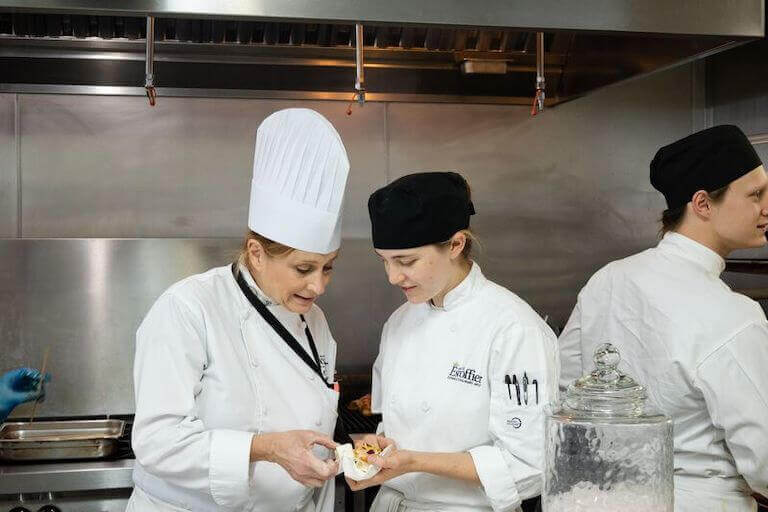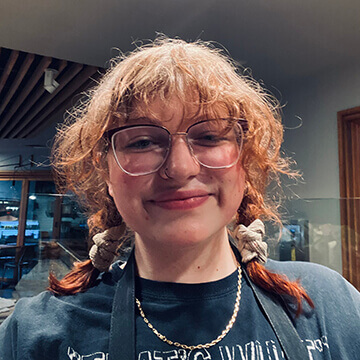Throughout your life, you may be faced with big financial decisions like going back to school, buying a home, or investing in a business venture.
These decisions naturally come with some element of risk, and risk can come with stress. Are you making the right choice? Will your investment pay off? Is it better to just remain where you are, rather than taking the risk?
Moments of large financial change may come with self-doubt, but you don’t have to resign yourself to sleepless nights. Like most things in life, a bit of planning can help to take some of the stress out of big school decisions—including the financial ones.†
1. Start By Doing the Research
Deciding to invest in school is going to be more stressful if you don’t have all the facts. Knowledge is a confidence booster!
Look to trusted online sources to start learning more. For example, prospective culinary school students should look at the cost of various programs so they can determine whether the one they’re considering is reasonably priced.‡
Keep your research organized. A spreadsheet can help you to keep track of important metrics. For culinary school, you could track costs like tuition, books, supplies, and the average cost of living in the area if you’re considering relocating. You may also want to look at non-financial metrics, like graduation rates, student-to-faculty ratios, and school diversity. The National Center for Education Statistics’ College Navigator site is a great resource for this information!
Assessing the Cost of Culinary School? Start Here!‡
If you’re considering the cost of culinary school, here’s an at-a-glance look at the range of costs for diploma and degree programs at Auguste Escoffier School of Culinary Arts.
- Diplomas in Culinary Arts (online, Boulder, or Austin): $19,569 – $23,272
- Associate Degrees in Culinary Arts (online, Boulder, or Austin): $35,145 – $39,365
- Pastry Arts Diplomas (online, Boulder, or Austin): $19,569 – $22,253
- Associate Degrees in Pastry Arts (online, Boulder, or Austin): $32,445 – $39,365
- Plant-Based Culinary Arts Diplomas (online or Boulder): $23,272 – $25,959
- Associate of Occupational Studies Degree in Plant-Based Culinary Arts (online only): $35,145
- Diploma in Food Entrepreneurship (online only): $23,272
- Associate of Occupational Studies Degree in Food Entrepreneurship (online only): $35,145
- Diploma in Holistic Nutrition and Wellness (online only): $23,272
- Associate of Occupational Studies Degree in Holistic Nutrition & Wellness (online only): $35,145
- Associate of Occupational Studies Degree in Hospitality and Restaurant Operations Management (online only): $34,770
All listed tuition costs are as of December 2024. For the most up-to-date information, see Tuition and Fees.
Note that online programs also require a computer, tablet, or mobile device in order to participate. Students may provide their own or pay an additional $250 Technology Fee for a Google Chromebook.
You may also want to consider the intangible benefits as you make financial decisions. For example: how much personal support can you expect at your school of choice? At Escoffier, online students can have access to a Success Coach to provide support if they run into challenges. Students at the Boulder and Austin campuses also have access to coaches and student service representatives to help them to reach their goals during school.
As you do your research, you can start to narrow down the field of options.
2. Clarify Exactly What Your Investment Gets You
If you’re considering a large financial investment, shouldn’t you know exactly what you can expect out of it? This is the case whether you’re purchasing a stake in a company, buying a condo, or attending culinary school.
Assumptions can lead to disappointment, so make sure you check the fine print to clarify all of the details.
Prospective Escoffier students can download a catalog for the Austin campus and/or the Boulder campus (including online programs) that lists details like which courses are included in each program, how many classroom vs. lab hours are in each course, and important dates for the academic year. These resources can answer questions and help you to do an apples-to-apples comparison between schools and curricula.
3. Get Some Outside Help
If it’s your first time making a big financial decision, you may not know exactly what information you need. That’s why it’s always smart to get some outside help from someone who knows the ropes.
When you’re buying a home, that help could come in the form of a real estate agent. But when you’re considering postsecondary education, most students don’t have that type of dedicated guide helping them through the process.
That’s why most schools have Financial Aid departments that can help answer your questions about tuition, fees, and financial aid options.
Escoffier’s Financial Aid department is available to help! They may be able to demystify the financial aid application process and help students understand what aid may be available to them. They can answer questions about filling out the Free Application for Federal Student Aid (FAFSA®) and they may be able to suggest payment plans to students who are eligible. Having a guide to walk you through the financing process may help students to feel like they have a clear plan and take some of the stress out of the paperwork.
“Every time I reached out to Financial Aid, they were always super attentive to the questions that I have and always responded in a timely manner. I did not always have that experience at universities that I’ve gone to, so it was a welcome change. Knowing that I would have an answer within 24 hours on a scary FAFSA question was so reassuring.”*
Kadie Sardo, Escoffier Boulder Culinary Arts Graduate
4. Do the Math To Figure Out How Much the Decision Can REALLY Cost
For most people, the cost of attending school is more than they can manage with a one-time outlay of cash. Instead, it’s much more common to secure outside financing in the form of scholarships, grants, and student loans.
Scholarships and grants are financial awards that don’t have to be repaid. Many schools, including Escoffier, can offer scholarships to students who demonstrate financial need and that apply and qualify. The federal government also offers need-based Pell grants to help low-income students access an education.
And for those who don’t qualify for need-based aid, or who need additional funding to supplement that aid, merit-based scholarships may be awarded based on a student’s skills and/or experiences.
Since these financial gifts don’t have to be repaid, students should apply to as many scholarships as they qualify for. Every dollar that a student secures in scholarships or grants is a dollar they won’t have to borrow in student loans!
Student loans are a valuable tool and have been the means of making postsecondary education possible for millions of people. But we want to make sure everyone who secures one does so with their eyes wide open.
Loans must be repaid with interest. And a single percentage point difference could add up to thousands of dollars over the life of the loan. Some loans also come with origination or application fees. That doesn’t necessarily mean they’re bad loans! But these are still important factors to consider.
To apply for federal grants and student loans, students will complete the Free Application for Federal Student Aid (FAFSA®). Filling out this form is the only way to find out what kind of federal aid you can receive. When assessing loan options, plug them into an amortization calculator to get the whole picture. Put in the total loan amount, the loan term (years it will take to repay), and the interest rate. The calculator will return your approximate monthly payment and tell you how much you might pay in interest over the life of the loan.
This process may be a big help before taking your next step…
5. Consider the Return on Your Investment
Don’t only think about what your investment will cost. Also consider what you could stand to gain! What is the possible return on your investment?
With culinary school, there may be a financial return. Some students may find that they are able to progress more quickly through the ranks of a kitchen after completing their education.* Online Culinary Arts student Damian Palacios said, “I think my career is on a faster track because of culinary school.”* So some students could see increased earning potential over the course of their careers with that education credential.*
Escoffier students and graduates also have access to Career Services, which can help them with interview preparation, assist with resume writing, and provide introductions and networking opportunities in some cases. This could open up additional employment opportunities that non-students don’t have access to.
But remember that not all investments only have a financial return. Take homeownership, for example. A home is generally an appreciating asset, meaning its value increases over time. But there are occasions—like when the 2008 housing bubble burst and home values plummeted—that a home can actually lose value. Still, home ownership can also come with non-financial returns. The stability of owning your home and not being subjected to rent increases can be a major benefit to some. And the ability to remodel and upgrade the home to your taste may be another.
Likewise with education, there may be non-financial returns such as:
- A network of like-minded students and chef instructors that you can bounce ideas off of
- Exposure to world cuisines that you may never have explored otherwise
- Building good habits right out of the gate, from the right way to hold a knife to proper sanitation techniques.
Between the possible financial returns and the non-monetary concerns…is it worth it to you?

Instruction from professional Chef Instructors is the foundation of the culinary school experience.
“As far as the cost, Escoffier was definitely worth it. You can’t put a price tag on knowledge and education.”*
Brent Unruh, Escoffier Culinary Arts Associate Degree Graduate & Executive Chef, Target Hospitality
6. Give Yourself Time to Make the Decision
Some decisions are more time-sensitive than others. But where there’s a big financial component at play, give yourself time to do the necessary research so you’ll feel confident with your decision. The last thing you want is to make a hasty commitment and regret it a few weeks later.
Also keep in mind that letting inertia take hold is how you let years pass without making any moves toward the future that you want. Give yourself a reasonable deadline to definitively decide. Maybe for you, that’s a month. Spend the month doing the research and asking the questions. And then, move forward with confidence and enthusiasm.
Get the Answers You Need For a Confident Decision
Big financial decisions come with a lot of questions. By gathering all the relevant information, getting answers from trusted advisors, and taking your time with the process, you can take some of the stress and urgency out of making these choices.
For additional research, the government Federal Student Aid office is a great place to start. You can get answers to all of these questions and more:
- Am I eligible to receive financial aid?
- What is the FAFSA® form?
- How do I check the status of my FAFSA® form?
- What will a parent need to fill out the FAFSA form?
- Which FAFSA® form do I need to fill out?
- How do I correct my FAFSA® form?
- I submitted my FAFSA® form. What happens next?
If you’re ready to talk to someone about the financial reality of culinary school, Escoffier’s Financial Aid department is here to help! Our team can help answer your questions about student loans and grants, payment plans, military and veterans benefits, and more! Contact us today to start getting the information you need to make an informed decision about your education.
To learn more about financing culinary school, try these articles next:
- How Long Does It Take to Pay Back Student Loan Debt…And Is It Worth It?
- How Financial Aid Works: FAQs About Funding for Culinary School
- How Much Can Culinary School Cost and How Can You Pay For It?
*Information may not reflect every student’s experience. Results and outcomes may be based on several factors, such as geographical region or previous experience.
†Note: As Auguste Escoffier School of Culinary Arts is based in the United States, the information provided here is specific to American students. International students should consult the tax codes of their respective countries. Nothing in this article is intended to be professional tax advice. Always consult a tax advisor regarding your specific situation.
‡Consider your situation and resources to determine what is affordable and on budget, for you.

 “Every time I reached out to Financial Aid, they were always super attentive to the questions that I have and always responded in a timely manner. I did not always have that experience at universities that I’ve gone to, so it was a welcome change. Knowing that I would have an answer within 24 hours on a scary FAFSA question was so reassuring.”*
“Every time I reached out to Financial Aid, they were always super attentive to the questions that I have and always responded in a timely manner. I did not always have that experience at universities that I’ve gone to, so it was a welcome change. Knowing that I would have an answer within 24 hours on a scary FAFSA question was so reassuring.”* “As far as the cost, Escoffier was definitely worth it. You can’t put a price tag on knowledge and education.”*
“As far as the cost, Escoffier was definitely worth it. You can’t put a price tag on knowledge and education.”*